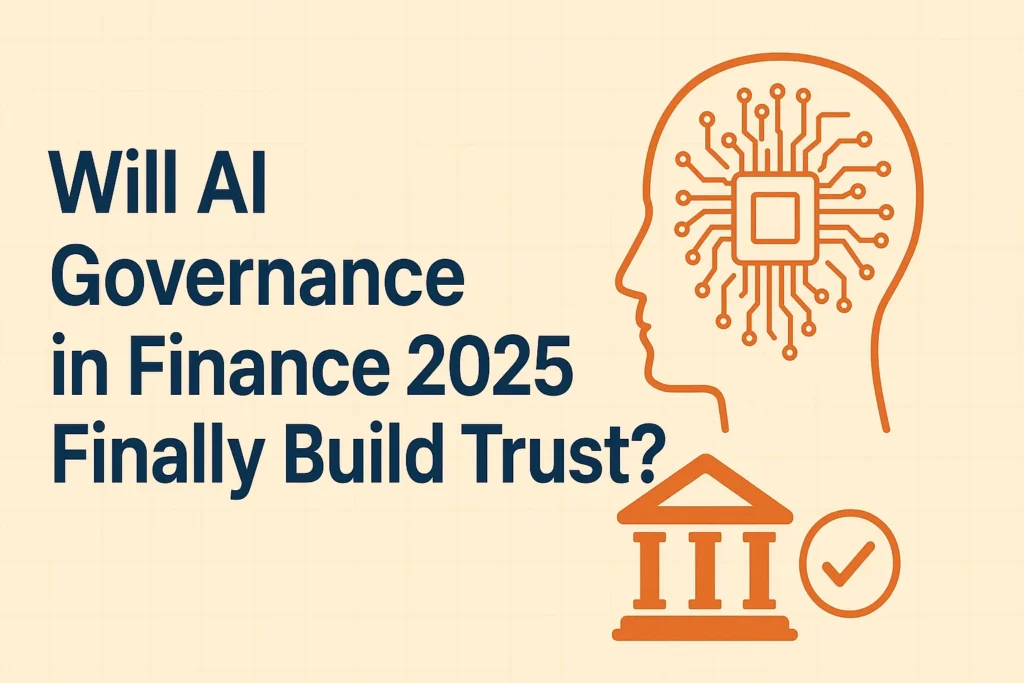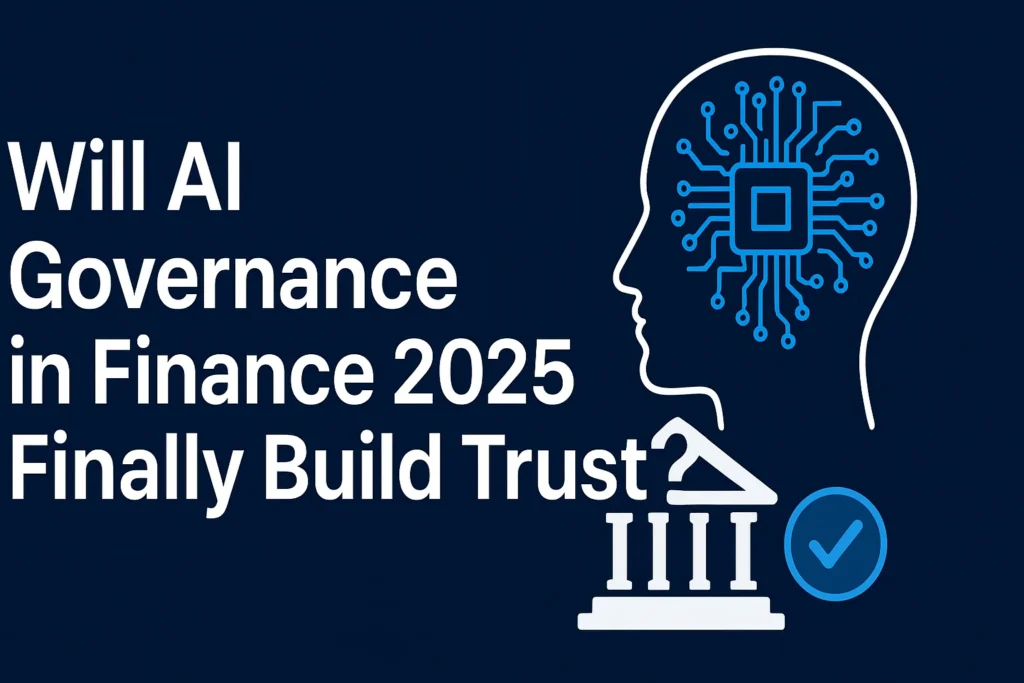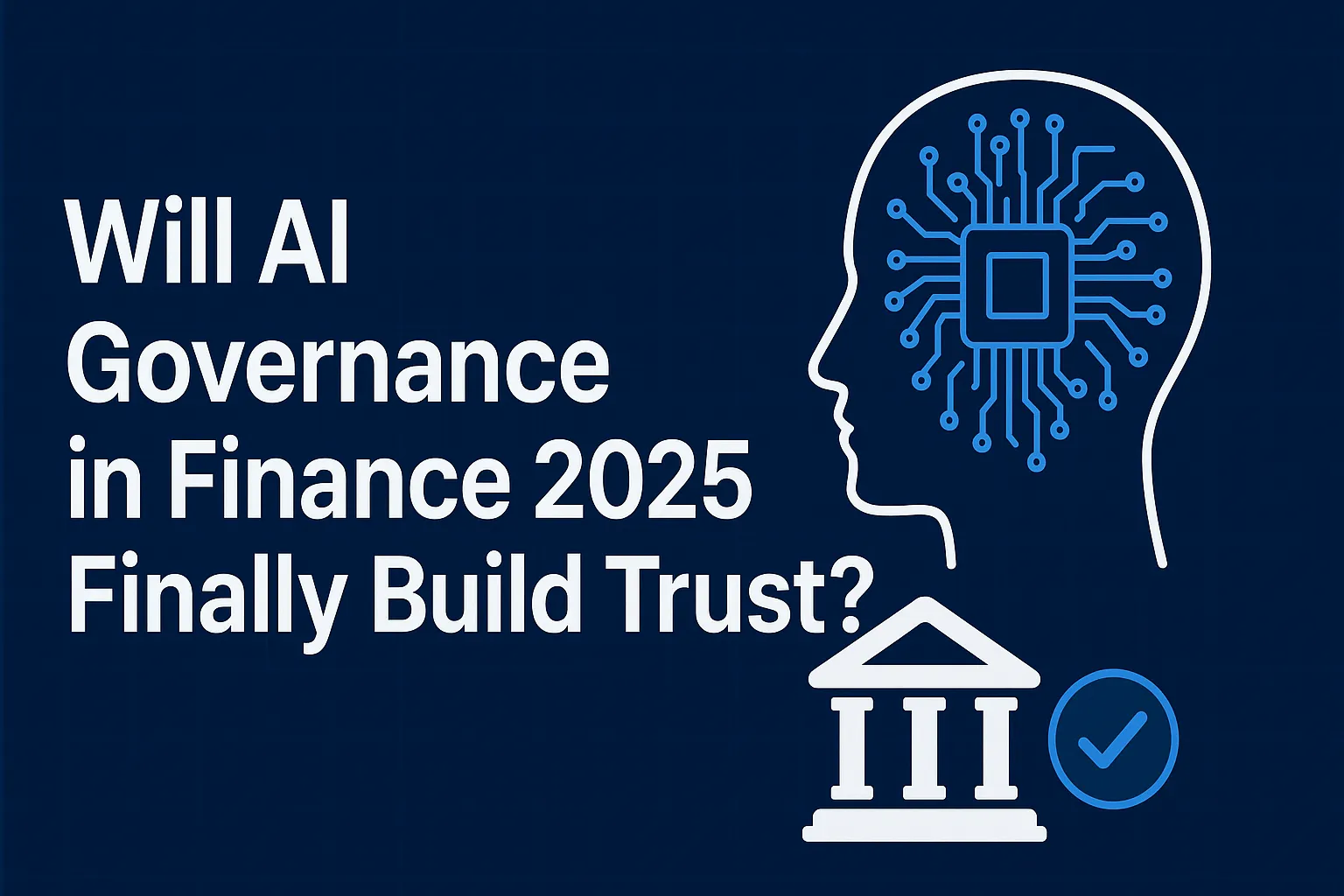Introduction
AI governance in finance has become one of the hottest debates in 2025. Banks, fintech companies, and regulators are racing to find the right balance between innovation and trust. Artificial intelligence (AI) is already transforming lending, fraud detection, trading, and customer support. Yet, without strong governance, finance risks falling into a dangerous trap of bias, lack of transparency, and consumer distrust.
In 2025, the question is louder than ever: Can AI governance in finance finally build trust? The financial sector depends on public confidence. If customers, investors, and regulators cannot rely on AI-driven decisions, the entire system may collapse under skepticism. That’s why AI governance—frameworks, policies, and ethical rules guiding AI systems—has become essential.
This article explores how AI governance in finance is evolving in 2025, what challenges remain, and whether these changes are enough to restore trust.

- Why AI Governance in Finance Matters in 2025
- What Does AI Governance in Finance Include?
- The State of AI Governance in Finance 2025
- Challenges
- Benefits
- AI Governance in Finance vs. Traditional Compliance
- Will AI Governance in Finance 2025 Finally Build Trust?
- Case Study: AI Governance in Finance at Major Banks
- How Banks Can Implement AI Governance in Finance
- Future of AI Governance in Finance
- Conclusion
- FAQs on AI Governance in Finance
- Affiliate & Legal Disclaimer
Why AI Governance in Finance Matters in 2025
AI is no longer a futuristic experiment in finance—it is the core of daily operations. From automated trading bots to AI-driven credit scoring, financial institutions rely on machine learning to make decisions worth billions.
But this power brings risks:
- Bias in AI models can deny fair credit access.
- Lack of transparency makes decisions hard to audit.
- Data privacy concerns threaten customer trust.
- Regulatory gaps leave financial systems vulnerable.
AI governance in finance ensures that AI systems follow ethical, transparent, and accountable guidelines. In 2025, it is the bridge between innovation and trust.
What Does AI Governance in Finance Include?
AI governance in finance isn’t just about compliance. It’s about building a culture of responsible AI. The framework generally includes:
| Component | Description | Impact on Finance |
|---|---|---|
| Transparency | Explaining how AI models make decisions | Builds customer trust |
| Fairness | Avoiding bias in lending, hiring, or investment decisions | Promotes financial inclusion |
| Accountability | Holding banks responsible for AI outcomes | Reduces risks |
| Security | Protecting sensitive financial data | Enhances safety |
| Compliance | Meeting government and global regulations | Prevents penalties |
| Auditability | Creating records of AI decisions for review | Improves oversight |
These elements make governance not just a regulatory requirement but a trust-building mechanism.
The State of AI Governance in Finance 2025
In 2025, the world is witnessing rapid adoption of governance frameworks:
- Europe’s AI Act is already influencing banks globally.
- The US Federal Reserve is testing AI audit standards.
- India and Southeast Asia are drafting financial AI guidelines to manage risk in growing fintech sectors.
- Global partnerships, like the OECD’s AI principles, aim for cross-border cooperation.
Banks that adopt AI governance early gain a competitive advantage—they attract investors, reduce regulatory risk, and improve customer satisfaction.
Challenges
Despite progress, challenges remain:
- Complexity of AI Models: Deep learning algorithms are often “black boxes,” making them hard to explain.
- Global Inconsistency: Different countries follow different rules, creating compliance headaches.
- Cost of Implementation: Smaller banks struggle with the high cost of audits and AI monitoring.
- Data Privacy Battles: Stricter data laws conflict with AI’s hunger for large datasets.
Transitioning into a trusted AI ecosystem requires financial institutions to balance these factors while staying innovative.
Benefits
Strong governance brings clear benefits:
- Restores Customer Confidence – People trust banks that are transparent.
- Improves Decision-Making – Clear governance reduces bias in lending and investment.
- Protects Against Risk – Early detection of fraud and compliance violations.
- Boosts Global Competitiveness – Financial institutions gain credibility in international markets.
- Encourages Responsible Innovation – Governance allows safe experimentation without damaging trust.

AI Governance in Finance vs. Traditional Compliance
| Feature | Traditional Compliance | AI Governance in Finance |
|---|---|---|
| Focus | Rules and regulations | Ethics + rules + transparency |
| Speed | Slow, manual audits | Real-time monitoring |
| Scope | Human-led decisions | AI-driven decision-making |
| Customer Trust | Limited | Stronger due to explainable AI |
| Global Standards | Localized | Moving toward international cooperation |
This comparison shows why AI governance in finance is the future, not just a legal necessity.
Will AI Governance in Finance 2025 Finally Build Trust?
The real question remains: Will governance be enough?
- Yes, if financial institutions adopt it sincerely, use explainable AI, and involve independent auditors.
- No, if governance becomes a box-ticking exercise without cultural change.
Trust will not come from regulations alone. It will come from consistent actions, transparent communication, and ethical leadership in finance.
Case Study: AI Governance in Finance at Major Banks
- JPMorgan Chase – Uses AI with explainability protocols to improve fraud detection while maintaining transparency.
- HSBC – Introduced an AI ethics board to ensure fairness in credit decisions.
- Indian Fintechs – Adopt hybrid governance models to balance innovation with compliance.
These examples prove that governance is not theoretical—it is already shaping financial systems.
How Banks Can Implement AI Governance in Finance
- Create AI Governance Committees – Mix of technologists, compliance officers, and ethicists.
- Adopt Explainable AI Tools – Ensure algorithms can be explained in plain language.
- Conduct Regular AI Audits – Internal and external reviews for accountability.
- Invest in AI Literacy Training – Staff must understand both risks and opportunities.
- Collaborate with Regulators – Proactive communication prevents penalties.
Future of AI Governance in Finance
By 2030, AI governance will likely become as common as cybersecurity compliance. Banks may even market themselves as “AI-Trust Certified” institutions. Customers will prefer financial institutions that guarantee fairness, transparency, and accountability.
The institutions that ignore governance risk losing trust, customers, and long-term growth.
Conclusion
AI governance in finance is no longer optional in 2025—it is essential. As AI takes center stage in lending, investments, fraud prevention, and customer service, the financial sector faces a critical challenge: building trust.
The frameworks emerging worldwide show promise. Yet, success depends on how seriously banks adopt them. Customers will not trust financial AI simply because it is regulated. They will trust it when decisions are transparent, fair, and explainable.
So, will AI governance in finance 2025 finally build trust? The answer depends on one thing: the willingness of financial leaders to prioritize ethics alongside profits. If they succeed, AI will not just power finance—it will transform it into a system built on trust, accountability, and transparency.
FAQs on AI Governance in Finance
1. What is AI governance in finance?
AI governance in finance is the framework of policies, ethics, and rules that guide the use of AI in banking and financial services to ensure fairness, transparency, and accountability.
2. Why is AI governance important in finance?
It prevents bias, protects customer data, ensures compliance, and builds trust in AI-driven financial decisions.
3. How does AI governance affect customers?
It ensures that credit scores, loan approvals, and investment advice are fair, transparent, and explainable.
4. What are the challenges of AI governance in finance?
Challenges include global inconsistency in rules, high costs of audits, and the complexity of AI models.
5. Which countries lead in AI governance in finance?
Europe (AI Act), the US (Federal Reserve initiatives), and India are leading in creating AI governance frameworks for finance.
6. Can AI governance in finance reduce fraud?
Yes. AI governance ensures fraud detection systems are transparent, ethical, and free from hidden biases.
7. Will AI governance in finance slow innovation?
Not necessarily. With the right balance, governance allows responsible innovation while maintaining trust.
8. What is the future of AI governance in finance?
By 2030, it is expected that global standards will emerge, and banks will market themselves as AI-trust certified institutions.
Affiliate & Legal Disclaimer
This article relies on internal data, publicly available information, and other reliable sources. It may also include the authors’ personal views. However, it’s essential to note that the information is for general, educational, and awareness purposes only—it doesn’t disclose every material fact. This analysis is for informational purposes only and does not constitute financial advice. Consult a professional before making investment decisions. This article contains affiliate links from Amazon and ClickBank. If you purchase through these links, we may earn a commission—at no extra cost to you.
We publish information on World Virtual CFO in good faith, solely for general information. World Virtual CFO doesn’t guarantee the completeness, reliability, or accuracy of this information. These are our views for informational purposes. When you use our website, know that any action you take is entirely at your own risk. World Virtual CFO won’t be liable for any losses or damages connected to your use of our website. For detailed information, refer to our disclaimer page.
Dr. Dinesh Sharma is an award-winning CFO and AI strategist with over two decades of experience in financial leadership, digital transformation, and business optimization. As the founder of multiple niche platforms—including WorldVirtualCFO.com—he empowers professionals and organizations with strategic insights, system structuring, and innovative tools for sustainable growth. His blogs and e-books blend precision with vision, making complex financial and technological concepts accessible and actionable.

Comments are closed.